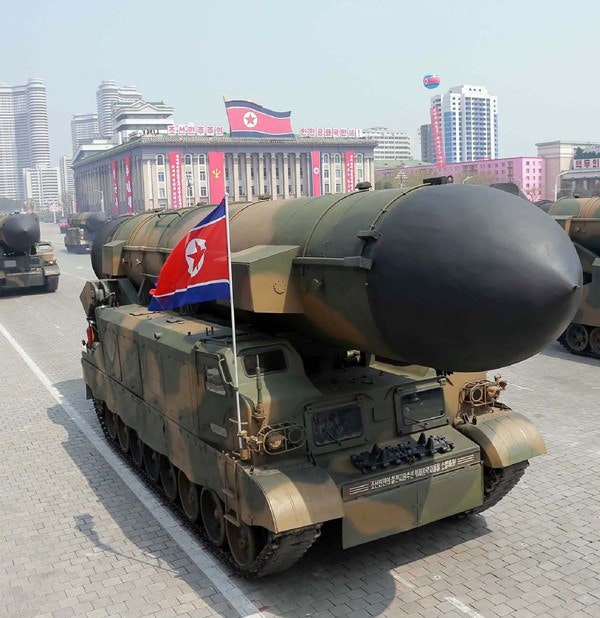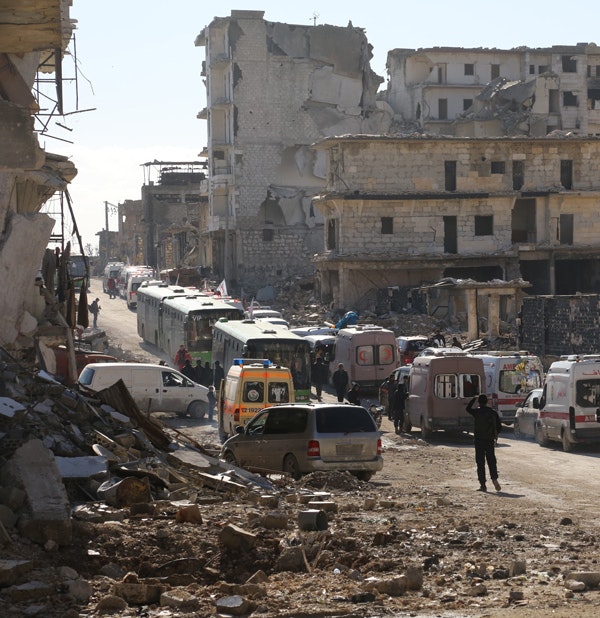Prioritizing Dangers
Two foreign policy experts from opposite sides of the aisle agree: threats lurk from many corners of the globe. Military success has to be defined in terms that address the fact no threat can be considered lesser than any other.
 This April 15, 2017 picture released from North Korea's official Korean Central News Agency shows ballistic missiles being on parade. (STR/AFP/Getty Images)
This April 15, 2017 picture released from North Korea's official Korean Central News Agency shows ballistic missiles being on parade. (STR/AFP/Getty Images)
Before the U.S. can determine its military budget, it first needs to know the threats the nation faces. The Catalyst convened two leading security thinkers from different starting points to discuss those threats: Thomas Donnell, a defense and security policy analyst at the American Enterprise Institute, and Michael O’Hanlon, a foreign and defense policy expert at the Brookings Institution. The pair discuss issues from Russia to China to cyber warfare in this interview with William McKenzie, editor of The Catalyst, and retired Army Colonel Miguel Howe, director of the Bush Institute’s Military Service Initiative.
What do you see as the highest priority threats facing the U.S.? A more muscular Russia? Rogue states like North Korea? Non-state actors like ISIS? Cyber warfare? Something completely different?
Mr. Donnelly, do you want to take the first crack at that?
Donnelly: Sure, except I’d rather answer a different question: What are we trying to achieve?
We need to know what success looks like before we decide the biggest impediment to success.
I would say success would mean defending and, where possible, expanding the liberal international system. The challenges are more global and systemic, so success will not be measured so much by turning back this challenge or that challenge.
In geopolitical terms, this would mean preserving and enhancing favorable bounds of power in the important theaters across Euro-Asia. The system won’t work unless we’re having some success in every theater. A failure in one can mean the whole system starts to unravel.
We set ourselves up for heartbreak when we decide which particular threat, or what kind of threat, is more important. We then consign lesser threats to a category that we basically don’t have to worry about.
I love all my threats equally. (Laughter)
We need to know what success looks like before we decide the biggest impediment to success. I would say success would mean defending and, where possible, expanding the liberal international system.
– Thomas Donnelly
O’Hanlon: I love Tom’s answer. I agree with it, it’s very well said, and it also is counterintuitive to have the guy from AEI talking about the big liberal vision, and the guy from Brookings mired down in more specific threats! I’m being a little facetious, but I do agree with Tom.
That said, let me get into the specific threats I worry about: Russia, China, North Korea, Iran, and violent extremism. These are the five that [Joint Chiefs of Staff Chairman] General [Joseph] Dunford has used. I worry about them because the forces of history are going to be favorable for advancing the liberal international order if those five threats don’t get in the way.
The one I worry about most is North Korea. It often gets ignored because North Korea’s the hermit kingdom that’s always been a danger to Seoul and the rest of the Korean Peninsula, but not so much to the region or the world. Now, it’s becoming more of the latter with its longer-range missiles and nuclear weapons inventory. We haven’t had a viable strategy or consensus for how to deal with it.
The [threat] I worry about most is North Korea. It often gets ignored because North Korea’s the hermit kingdom that’s always been a danger to the Korean Peninsula, but not so much to the region or the world. Now, it’s becoming more of the latter.
-Michael O’Hanlon
Vladimir Putin has to be elevated near the top of the list. My guess is he’s smart enough not to actually let all of his adventurism lead us into a great power war. But he’s playing a very risky game and he’s dancing around the edges of some core American vital interests, like the Baltic States. We have to prioritize him, and therefore Russia.
We’re doing okay in the U.S.-China relationship. It’s going to take a lot of attention, there are a lot of ways it could go wrong, but we are on a pretty reasonable and fairly bipartisan path in how we deal with China, especially in the security route.
The basic logic of what we’re doing with Iran is probably the right strategy. It doesn’t guarantee good outcomes, but a combination of holding them to comply with the infamous nuclear deal and being tougher against them in the region in other ways is probably the right strategy. I see the Trump administration evolving in that direction.
Then, finally, ISIS, violent extremism, and al Qaeda. This is certainly a big concern, but I don’t see it likely to become a much larger concern in our security policy than it’s been for the past 15 years. If they got their hands on a nuclear weapon I would be proven wrong in a heartbeat, but I don’t see this problem rising to an even greater magnitude in the years ahead.
So, I would prioritize Russia and North Korea in terms of where I think we’ve got to put on our thinking caps and get a little more creative in our national security policies and how we build our nuclear or own military forces.
 Russian President Vladimir Putin listens to his Uzbek counterpart during their talks at the Kremlin in Moscow on April 5, 2017. (Pavel Golovkin/AFP/Getty Images)
Russian President Vladimir Putin listens to his Uzbek counterpart during their talks at the Kremlin in Moscow on April 5, 2017. (Pavel Golovkin/AFP/Getty Images)
As a concept, probably everyone can agree that better relations with Russia would help, but we don’t want to be too cooperative with a muscle-flexing Putin. How do we find a balance?
Donnelly: Again, we are looking down the wrong end of the telescope. Our interests in Europe are not defined by whether we have good relations or bad relations with Russia or really any one nation.
We’re interested in there being what, fortunately, still basically exists in Europe, and that is the liberal democratic order. It’s better for us to judge where we are, and what we need to do, based upon the results that we want, or the outcomes we want.
It’s better for us to judge where we are, and what we need to do, based upon the results that we want, or the outcomes we want.
– Thomas Donnelly
Russia causes us trouble but the underlying balance of power in Europe is still extraordinarily favorable. Yes, the Russia challenge is multi-faceted, but it’s also among the lesser ones. I agree that we have to find more creative ways to deal with it and match our military posture to our treaty commitments to Europe. But the way to not lose our way is to begin with what we are trying to achieve. That way, knowing our security interests are a constant, we can adapt and change as threats change or diminish.
O’Hanlon: There’s a lot of wisdom in what Tom said. Still, I worry that Vladimir Putin is in this for the long haul. He’ll be constantly probing and looking for new opportunities and ways to weaken the West.
If he could tear down the architecture of the liberal order that Tom was talking about, he would really feel like he could go into his retirement, sit smugly and drink vodka, and consider that mission accomplished. He’s not likely to do something that produces a direct military response by the West, but he’s always going to be looking for opportunities.
If [Putin] could tear down the architecture of the liberal order … he would… sit smugly and drink vodka, and consider that mission accomplished. He’s not likely to do something that produces a direct military response by the West, but he’s always going to be looking for opportunities.
-Michael O’Hanlon
Some of that would involve things like cyber war or messing around in western elections. He would look for areas where our commitment is not as firm or clear and try to exercise greater Russian power or influence there.
At some point, he could miscalculate how or where he does this. That’s why I would like to change the terms of the conversation with him, if possible.
A lot of people don’t like my particular proposal for how to do that, but I think the current NATO expansion logic and process has gone far enough. We’re better off looking for a security order in Eastern Europe that would not consider the further expansion of NATO.
We need to strengthen our military defenses of the Baltics. Separately, we need to insist on the right of Ukraine and Georgia to join the European Union without Russian interference.
There are other things that we have to do to make sure there’s not a reward for Vladimir Putin, but where we are right now is not a good place. There are better architectures for the region that might help us more.
How does preserving the liberal democratic order versus addressing more traditional priorities impact and drive military strategies and resources?
Donnelly: Things in Europe and East Asia, with the exception of North Korea, are pretty good, so the mission is to deter and maintain. As China is trying to push out into maritime East Asia, it ought to be possible to make it very difficult for them to do that.
The Middle East is a completely different kettle of fish. There’s no status quo to preserve. But in shaping the military, we need to be able deter immediate crises in East Asia and West Europe while figuring out what to do should a serious conflict break out in the Middle East. It’s kind of an everyday shaping-and-engagement mission that has to go on pretty much everywhere yet still allow us to respond in a timely fashion if something larger is called for.
We have really lost our ability to think about expansion and mobilization since we’ve gone to the all-volunteer force. What we’re finding now is that, as the force shrinks, it’s just inadequate to preserve the liberal international order.
I think of this more in terms of being able to present on a constant basis across Eurasia while retaining the ability to intervene in a decisive way in the case of a really large-scale conflict.
 China's President Xi Jinping reviews paramilitary guards with Myanmar's President Htin Kyaw at a welcome ceremony at the Great Hall of People in Beijing on April 10, 2017. (Fred Dufour/AFP/Getty Images)
China's President Xi Jinping reviews paramilitary guards with Myanmar's President Htin Kyaw at a welcome ceremony at the Great Hall of People in Beijing on April 10, 2017. (Fred Dufour/AFP/Getty Images)
O’Hanlon: Let me zero in on the U.S. – China relationship and that part of the world.
We are central to undergirding the security environments in three key regions of the world. We’re doing it with a military that is small, relative to the size of the population. We have only 1.3 million active duty forces. And our military’s only about 3 percent of our GDP. In the Cold War, it often was 6, 8, 10 percent of GDP.
In a book that Jim Steinberg, the former deputy secretary of state and former LBJ School dean, and I wrote a couple of years ago, we suggested that, rather than encourage a huge new American military buildup, and I’m not against a modest one of roughly the Trump scale, it would be nice to see China recognize that the current international order actually serves its interest pretty well.
Now, obviously, a lot of Chinese are not going to buy this argument. And they won’t want us as prevalent in the Western Pacific. But the results tend to support my argument and Tom’s argument that the U.S.-based or U.S.-led international orders have been pretty good even for countries like China.
This is an argument in favor of understanding why the U.S. defense budget has to be substantially bigger than that of any other country. We should stand by that principle.

How does the threat of Iran in the Middle East impact this global framework?
O’Hanlon: You have to look at Iran and ISIS together. What Iran’s trying to do is promote the interests of its allies and proxies in any place there is a Shia population, or a claim by Shia to a historical or other basis for land resources, territory, and political power.
We have to view Iran in these terms. A lot of the turbulence in the Middle East has been Iran’s fault. We deserve a little bit of this, too, although I don’t think we’re trying to maximize our power or influence. Iran’s been trying very much to disrupt the existing order. You can see this in the way they influenced former Prime Minister Maliki in Iraq to behave in a sectarian fashion. You can see it in how they’ve helped President Assad brutally barrel bomb neighborhoods throughout Syria. And you see it in Yemen.
We have to accept that we are in a struggle in the Middle East which is not just against ISIS but it’s also against Iran and these two forces are often present in the same conflict. The danger in separating them out is that you have to come up with a strategy that addresses both simultaneously. That includes factors like the poor governance and corruption that many governments have had in the Middle East. That creates opportunities for groups like ISIS or Iran.
The real point is that we’re in a competition with Iran for the long haul. This will require us to have clever strategies that are not just military but also political.
The real point is that we’re in a competition with Iran for the long haul. This will require us to have clever strategies that are not just military but also political.
 A convoy including buses and ambulances in Aleppo, Syria on December 15, 2016 evacuate civilians trying to flee from siege by Iran-led Shiite militias and Assad Regime forces. (Jawad al Rifai/Anadolu Agency/Getty Images)
A convoy including buses and ambulances in Aleppo, Syria on December 15, 2016 evacuate civilians trying to flee from siege by Iran-led Shiite militias and Assad Regime forces. (Jawad al Rifai/Anadolu Agency/Getty Images)
Donnelly: I’m going to do exactly what Michael has done and violently agree with what was just said.
We like bipartisanship.
But I would even take it a step further. If there’s any sort of overarching failure that has characterized American policy and strategy toward the Middle East, it’s been this desire to make the problem artificially smaller rather than to see it in large aspects. We need to recognize what our real interest is in the region and stop trying to look for a partner who’s going to share those concerns.
If there’s any sort of overarching failure that has characterized American policy and strategy toward the Middle East, it’s been this desire to make the problem artificially smaller rather than to see it in large aspects. We need to recognize what our real interest is in the region and stop trying to look for a partner who’s going to share those concerns.
-Thomas Donnelly
Let’s talk about cyber warfare. Do we have the appropriate budget, strategies, and tools to be engaged a new arena of cyber warfare?
O’Hanlon: Absolutely not. If we have a national Achilles heel, it’s this one we’re creating for ourselves in the form of the internet and everything that we’re now depending upon through it and with it and for it.
We didn’t even think of this as a realm of likely warfare as we built up the internet. Therefore, we’re playing catch up in an area where there are constant probes and attacks.
Russia and China, in particular, know a lot about our vulnerabilities. We have ways to deter them. We could respond in-kind, economically or militarily, once we rebuild our capacity because some cyber attacks could really put us on the mat for a while.
I’m not predicting this will happen. But, if there’s one vulnerability that we really don’t even know how to fully assess, and that is probably substantially greater than we’ve been thinking for years, it’s that one.
If we have a national Achilles heel, it’s this one we’re creating for ourselves in the form of the internet and everything that we’re now depending upon through it and with it and for it.
– Michael O’Hanlon
Donnelly: One thing that does particularly worry me is what would constitute war in this domain. What would legitimate the use of force or retaliation based on some sort of cyber attack or cyber probe?
Who knows exactly what the Russians did to sort of influence the outcome of the election. But you would think that in one of these occasions there should be some form of retaliation. Maybe things have been done to make the Russians pay a price for this. But, because it is in the shadows, or if it is in the shadows, it loses its political relevance. At some point, some American government will have to do something in a public way to prove that there’s a price to be paid for meddling with our electrons or our networks.
The pace of technology, capabilities, or weapons could probably be that we use the capability once and then lose it, or lose the exclusive monopoly once the knowledge is in the public domain. But, at the moment, it’s hard to know where we stand on this front in the sense of strategic competition.
The Catalyst believes that ideas matter. We aim to stimulate debate on the most important issues of the day, featuring a range of arguments that are constructive, high-minded, and share our core values of freedom, opportunity, accountability, and compassion. To that end, we seek out ideas that may challenge us, and the authors’ views presented here are their own; The Catalyst does not endorse any particular policy, politician, or party.
-
Previous Article An Unpredictable World of Threats A Conversation with Robert Gates, Former Secretary of Defense under Presidents George W. Bush and Barack Obama
-
Next Article Getting Ahead of the Enemy’s Next Move An Essay by General Norton A. Schwartz, USAF (Ret.), Former Chief of Staff of the U.S. Air Force and President and CEO of Business Executives for National Security


